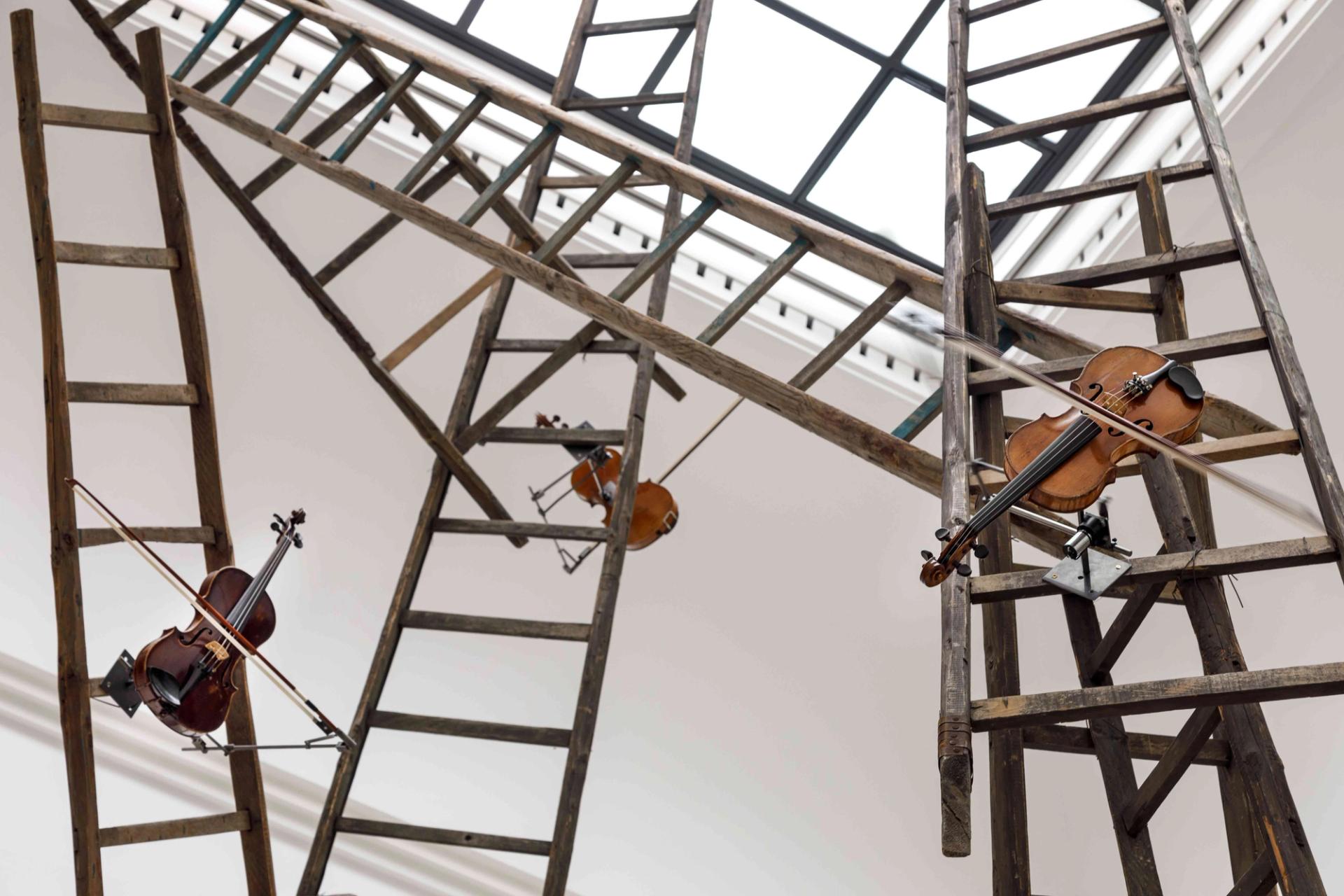The German-born artist Rebecca Horn—known for her innovative conceptual exploration of the human body in sculptures, films, performances and photographs—has died aged 80. Her death was confirmed on social media by Sean Kelly Gallery in New York who called her “one of the most prominent artists of her generation”.
Horn was born in 1944 in Michelstadt, Germany, and later studied at Hochschule für Bildende Künste, Hamburg, and St Martins School of Art in London. Most of her work draws on illness including a key period as a teenager when she contracted tuberculosis. The writer Lauren Mechling said last year that “infused with poetry and pain, Horn’s output plays with the possibilities and limitations of the human body.”
A pivotal series, Personal Art (1968-72), included early examples of her body-modification suits made of bandages, belts and feathers which have been described as “wearable sculpture”.
In 1972, she made Pencil Mask, which transforms the wearer’s head into a drawing instrument. "All pencils are about two inches long and produce the profile of my face in three dimensions. I move my body rhythmically from left to right in front of a white wall. The pencils make marks on the wall the image of which corresponds to the rhythm of my movements," she said. The work is owned by Tate.
In 1992, Tate Britain showed her Ballet of the Woodpeckers installation. “Here small hammers tap mirrors like birds startled by their own reflection. It was originally installed in a psychiatric hospital in Vienna. Long-term patients experienced it alongside external visitors. To recall the presence of the patients when the work was moved, Horn added two glass funnels filled with mercury,” the Tate caption reads.
Concurrent with her installations and performances, Horn maintained a rich drawing practice throughout her career, the Sean Kelly gallery adds, saying: “At times, her drawings have been coextensive of her work in other media, as in her drawings which document sculptural proposals. Horn’s Bodylandscape drawings, produced between 2003 and 2015, translate the interest in exploring the limits of the body present in her sculptures and performances to the medium of drawing.”
In a 1994 interview with Frieze magazine, Horn said: “Taboos change enormously within each generation, so perhaps mine are a little different from yours. Everything is possible, if you want it enough. There are different limits. You must walk close to the edge. Genet, Buñuel, Pasolini... These are people who went to the edge. That's important, even if you are attacked for it.”
This week the Berlin-based Galerie Thomas Schulte launches a show dedicated to Horn entitled Concert of Sighs (11 September-2 November). “Piled on the floor are building pallets, wall fragments, and wooden boards, lay strewn in piles on the floor from which thin copper tubes wind like plant shoots, ending in funnel-like trumpet mouths. The artist used building materials from the ruins of Venetian houses for her installation, which was originally created for the 1997 Venice Biennale,” the gallery says in a statement.

Installation view of Rebecca Horn’s Tower of the Nameless (1994) Photo: Markus Tretter © VG Bild-Kunst, Bonn 2024
Horn was also an honorary Royal Academician (Royal Academy of Art, London). “The essence of imagery [in her work] comes out of the tremendous precision of the physical and technical functionality she uses to stage her works each time within a particular space,” a Royal Academy statement says.
Earlier this year a retrospective of works by Horn opened at the Haus der Kunst in Munich; Jana Baumann, the co-curator of the show, featured on The Art Newspaper’s podcast The Week in Art. Andrea Lissoni, the artistic director at the Munich gallery, said that Horn is a visionary artist who stages the interplay of bodies, machines, moving images, and sound in “new, unique and diverse languages that are ahead of their time”.
Rebecca Horn; born Michelstadt, Gau Hesse-Nassau, Germany, 24 March 1944; Documenta Preis, Kassel 1986, Carnegie Prize, Carnegie International, Pittsburgh 1988, Hon RA (Honorary Royal Academician) 2009, Praemium Imperiale Prize for sculpture, Japan Art Association 2010; died Bad König, Hesse, Germany, 6 September 2024.


